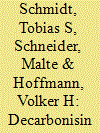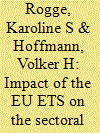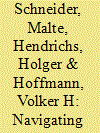|
|
|
Sort Order |
|
|
|
Items / Page
|
|
|
|
|
|
|
| Srl | Item |
| 1 |
ID:
112274


|
|
|
|
|
| Publication |
2012.
|
| Summary/Abstract |
In the power sector, technological change is a key lever to address the decarbonisation needed to avoid dangerous climate change. Policy makers aim to accelerate and redirect technological change by targeting relevant firms via climate policy, e.g., the European Union Emissions Trading System (EU ETS), and climate-relevant technology policies, e.g., feed-in tariffs. Changes in firm's behaviour, i.e., their research and development (R&D) as well as diffusion activities, are at the heart of technological change. However, firms are heterogeneous actors with varying attributes which perceive policy differently. Hence, they can be expected to react very heterogeneously to these new policies. Based on an original dataset of 201 firms, we perform a cluster analysis grouping firms along their R&D and diffusion activity changes. We then compare these clusters with regards to the characteristics of the contained firms. Our analysis results in seven clusters showing very diverse contributions to low-carbon technological change, suggesting potential for policy to become more effective. A comparison of the firms' characteristics allows us to derive indicative recommendations on how to adjust the policy mix in order to induce contributions from most firms in the power sector.
|
|
|
|
|
|
|
|
|
|
|
|
|
|
|
|
| 2 |
ID:
101458


|
|
|
|
|
| Publication |
2010.
|
| Summary/Abstract |
This paper provides an overview of early changes in the sectoral innovation system for power generation technologies which have been triggered by the European Emission Trading System (EU ETS). Based on a broad definition of the sector, our research analyses the impact of the EU ETS on the four building blocks 'knowledge and technologies', 'actors and networks', 'institutions', and 'demand' by combining two streams of literature, namely systems of innovation and environmental economics. Our analysis for Germany is based on 42 exploratory interviews with experts in the field of the EU ETS, the power sector, and technological innovation. We find that the EU ETS mainly affects the rate and direction of technological change of power generation technologies within the large-scale, coal-based power generation technological regime, to which carbon capture technologies are added as a new technological trajectory. While this impact can be interpreted as the defensive behaviour of incumbents, the observed changes should not be underestimated. We argue that the EU ETS' impact on corporate CO2 culture and routines may prepare the ground for the transition to a low-carbon sectoral innovation system for power generation technologies.
|
|
|
|
|
|
|
|
|
|
|
|
|
|
|
|
| 3 |
ID:
093499


|
|
|
|
|
| Publication |
2010.
|
| Summary/Abstract |
From a slow start, the clean development mechanism (CDM) market has recently experienced enormous growth. However, the CDM market has been increasingly criticised, resulting in a lively debate about how to reform, complement, or replace it. In order to increase transparency and assist policy-makers in better understanding the current market, we depart from the traditional project-level perspective on CDM and analyse commercial activities by utilising data from UNEP Risoe's CDM Bazaar. To this end, we first establish a seven-step value chain by conducting a factor analysis on the commercial activities indicated in the Bazaar and, second, identify nine prevalent business models with a cluster analysis of all 495 participating organisations. Based on these analyses, we discuss potential impacts on the value chain of different policy scenarios that rely on carbon credits as incentive. We find that the importance of specific regulatory CDM know-how and general business activities such as finance varies strongly with the different policy scenarios. Our analysis serves to sensitise policy-makers and business about implications of different regulatory designs.
|
|
|
|
|
|
|
|
|
|
|
|
|
|
|
|
| 4 |
ID:
111094


|
|
|
|
|
| Publication |
2012.
|
| Summary/Abstract |
This paper examines the role of prior knowledge in offsetting CO2 emissions from fuel consumption in vehicle use. The main result of our econometric analysis on the basis of unique representative data from drivers' license holders in the USA and Germany refers to the strong discrepancy between the stated and revealed knowledge of CO2 offsetting. The revealed knowledge - measured by the correct estimation of the costs for this offsetting practice - has a positive impact on the stated purchase of corresponding offsetting credits in both countries. In contrast, the effect of the stated knowledge of offsetting is not robust and in some cases even negative. Surprisingly, it cannot even be confirmed that drivers' license holders who claim that they are more than sufficiently informed estimate these costs more accurately.
|
|
|
|
|
|
|
|
|
|
|
|
|
|
|
|
|
|
|
|
|